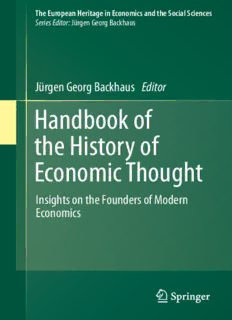
Handbook of the History of Economic Thought: Insights on the Founders of Modern Economics PDF
Preview Handbook of the History of Economic Thought: Insights on the Founders of Modern Economics
The European Heritage in Economics and the Social Sciences Series Editor: Jürgen Georg Backhaus Editor Jürgen Georg Backhaus Handbook of the History of Economic Thought Insights on the Founders of Modern Economics The European Heritage in Economics and the Social Sciences Series Editor: Jürgen Georg Backhaus For further volumes: http://www.springer.com/series/5902 Jürgen Georg Backhaus Editor Handbook of the History of Economic Thought Insights on the Founders of Modern Economics Editor Prof. Dr. Jürgen Georg Backhaus University of Erfurt Krupp Chair in Public Finance and Fiscal Sociology Nordhäuser Str. 63 99089 Erfurt Thüringen Germany [email protected] ISBN 978-1-4419-8335-0 e-ISBN 978-1-4419-8336-7 DOI 10.1007/978-1-4419-8336-7 Springer New York Dordrecht Heidelberg London Library of Congress Control Number: 2011934677 © Springer Science+Business Media, LLC 2012 All rights reserved. This work may not be translated or copied in whole or in part without the written permission of the publisher (Springer Science+Business Media, LLC, 233 Spring Street, New York, NY 10013, USA), except for brief excerpts in connection with reviews or scholarly analysis. Use in connection with any form of information storage and retrieval, electronic adaptation, computer software, or by similar or dissimilar methodology now known or hereafter developed is forbidden. The use in this publication of trade names, trademarks, service marks, and similar terms, even if they are not identifi ed as such, is not to be taken as an expression of opinion as to whether or not they are subject to proprietary rights. Printed on acid-free paper Springer is part of Springer Science+Business Media (www.springer.com) Preface Avant Propos A further reason for studying the history of economic thought was provided by Pareto in the lead article of the “Giornale di Economisti” of 1918 (Volume 28; pages 1–18) under the title “Experimental Economics”.1 In as much as economic theories also have an extrinsic value, that is, they lead people to act as informed by the t heory, such as in economic policy or public fi nance, the theory becomes a subject for economic investigation itself. The distinction between the intrinsic aspect and the extrinsic aspect of a theory is crucial for this argument. The intrinsic aspect of a theory refers to its logical consistence and, as such, has no further repercussions. As far as the intrinsic aspects are concerned, theoretical knowledge is actually cumula- tive. On the other hand, the extrinsic aspect of an economic theory will become a “derivation” (in Pareto’s terminology) in that it serves as the rationalization of human activity. In Pareto’s sociology, human action is determined by residues, innate traits that determine human behaviour, and derivations. Derivations are more or less logical theories or world views that guide people’s behaviour. To the extent that economic theory can also guide human behaviour, economic theory becomes a social fact or construct that is itself subject to economic analysis. As we experiment with different economic theories to guide economic policy in general and fi scal policy in particular, the history of economic thought can actually be practised as experimental economics in documenting the impact different economic theories have on economic behaviour. Of course, this experimental kind of history of e conomic thought becomes the more relevant the more similar the situations are in which different economic theories are applied. 1 The following account is based on Michael McLure, The Paretian School and Italian Fiscal Sociology. London, Palgrave 2007. v Contents 1 Introduction ............................................................................................ 1 Jürgen G. Backhaus 2 The Tradition of Economic Thought in the Mediterranean World from the Ancient Classical Times Through the Hellenistic Times Until the Byzantine Times and Arab-Islamic World ................ 7 Christos P. Baloglou 3 Mercantilism ........................................................................................... 93 Helge Peukert 4 The Cameralists: Fertile Sources for a New Science of Public Finance .................................................................................... 123 Richard E. Wagner 5 The Physiocrats ...................................................................................... 137 Lluis Argemí d’Abadal 6 Adam Smith: Theory and Policy .......................................................... 161 Andrew S. Skinner 7 Life and Work of David Ricardo (1772–1823) ..................................... 173 Arnold Heertje 8 John Stuart Mill’s Road to Leviathan: Early Life and Infl uences ...................................................................... 179 Michael R. Montgomery 9 John Stuart Mill’s Road to Leviathan II: The Principles of Political Economy..................................................... 205 Michael R. Montgomery 10 Jeremy Bentham (1748–1832) ............................................................... 279 Christos P. Baloglou vii viii Contents 11 Johann Heinrich von Thünen: A Founder of Modern Economics ............................................................................ 299 Hans Frambach 12 The Legacy of Karl Marx ...................................................................... 323 Helge Peukert 13 Friedrich List’s Striving for Economic Integration and Development .................................................................................... 351 Karl-Heinz Schmidt 14 The Entwickelung According to Gossen .............................................. 369 Jan van Daal 15 Gustav Schmoller as a Scientist of Political Economy ........................ 389 Reginald Hansen 16 The Empirical and Inductivist Economics of Professor Menger ............................................................................... 415 Karl Milford 17 Antoine Augustin Cournot .................................................................... 437 Christos P. Baloglou 18 Léon Walras: What Cutes Know and What They Should Know .......................................................................................... 465 J.A. Hans Maks and Jan van Daal 19 Alfred Marshall ...................................................................................... 495 Earl Beach 20 Knut Wicksell and Contemporary Political Economy ....................... 513 Richard E. Wagner 21 Werner Sombart ..................................................................................... 527 Helge Peukert 22 The Scientifi c Contributions of Heinrich von Stackelberg ................. 565 Peter R. Senn 23 Joseph Alois Schumpeter: The Economist of Rhetoric ...................... 581 Yuichi Shionoya 24 Against Rigid Rules – Keynes’s View on Monetary Policy and Economic Theory ............................................................................ 605 Elke Muchlinski 25 Keynes’s “Long Struggle of Escape” .................................................... 625 Royall Brandis Contents ix 26 John Maynard Keynes and the Theory of the Monetary Economy ..................................................................... 641 Hans-Joachim Stadermann and Otto Steiger 27 James Steuart and the Theory of the Monetary Economy ................ 667 Hans-Joachim Stadermann and Otto Steiger 28 Friedrich August Hayek (1899–1992) ................................................... 689 Gerrit Meijer Index ................................................................................................................ 713
